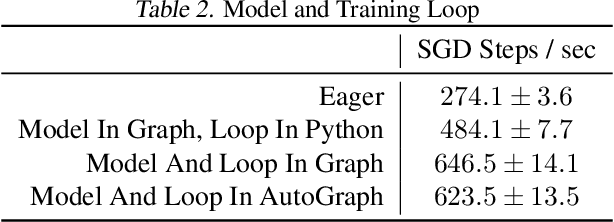Alexander B Wiltschko
AutoGraph: Imperative-style Coding with Graph-based Performance
Oct 16, 2018


Abstract:There is a perceived trade-off between machine learning code that is easy to write, and machine learning code that is scalable or fast to execute. In machine learning, imperative style libraries like Autograd and PyTorch are easy to write, but suffer from high interpretive overhead and are not easily deployable in production or mobile settings. Graph-based libraries like TensorFlow and Theano benefit from whole-program optimization and can be deployed broadly, but make expressing complex models more cumbersome. We describe how the use of staged programming in Python, via source code transformation, offers a midpoint between these two library design patterns, capturing the benefits of both. A key insight is to delay all type-dependent decisions until runtime, via dynamic dispatch. We instantiate these principles in AutoGraph, a software system that improves the programming experience of the TensorFlow library, and demonstrate usability improvements with no loss in performance compared to native TensorFlow graphs. We also show that our system is backend agnostic, and demonstrate targeting an alternate IR with characteristics not found in TensorFlow graphs.
Tangent: Automatic differentiation using source-code transformation for dynamically typed array programming
Sep 26, 2018Abstract:The need to efficiently calculate first- and higher-order derivatives of increasingly complex models expressed in Python has stressed or exceeded the capabilities of available tools. In this work, we explore techniques from the field of automatic differentiation (AD) that can give researchers expressive power, performance and strong usability. These include source-code transformation (SCT), flexible gradient surgery, efficient in-place array operations, higher-order derivatives as well as mixing of forward and reverse mode AD. We implement and demonstrate these ideas in the Tangent software library for Python, the first AD framework for a dynamic language that uses SCT.
 Add to Chrome
Add to Chrome Add to Firefox
Add to Firefox Add to Edge
Add to Edge